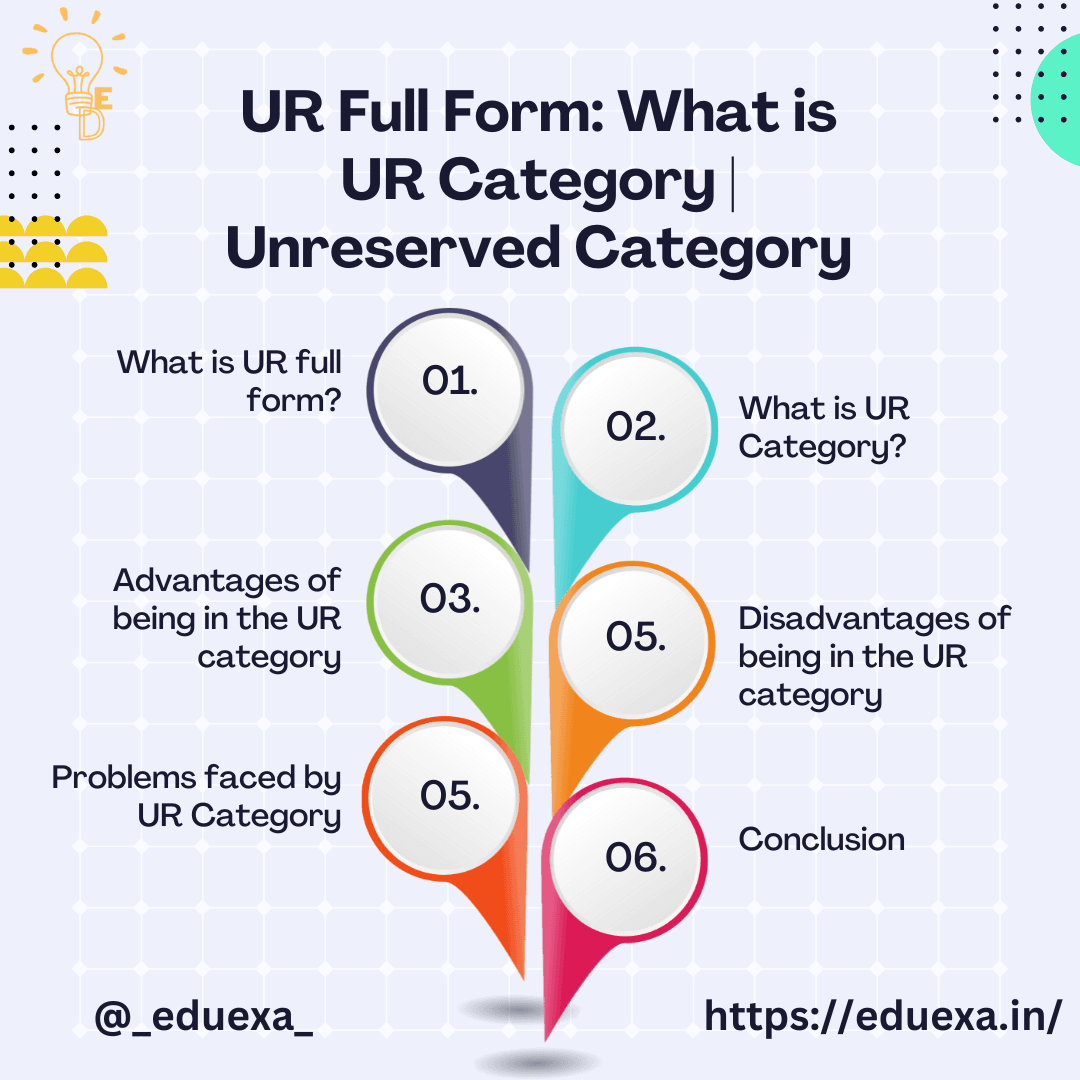Introduction
Recently Indian Constitution gives reservation to the EWS Category and introduce the concept of Creamy Layer in the Reserved Category. Indian Constitution provide for Reservation for several categories in India like SC(Schedule Caste), ST(Schedule Tribe), OBC(Other Backward Classes), EWS(Economically Weaker Section). In this Article we cover all the aspects of UR Category from the UR full form to Advantage and Disadvantage, Problems etc. Read the complete guide to know everything about this UR category.
What is UR full form?
The official UR full form is Unreserved Category. According to Indian Law UR Category means or Unreserved Category is that section Indian Society which does not get any time of Reservation in Government Institution, Colleges, Jobs etc. Also they face high cut off marks as compared to reserved category candidates.
What is UR Category?
UR Category is the category in Indian Reservation system which don’t get any type of Reservation in Government Institution, Colleges, Jobs etc. The Candidates which don’t come under the SC(Schedule Caste), ST(Schedule Tribe), OBC(Other Backward Classes), EWS(Economically Weaker Section) Categories are the ones who belongs to Unreserved Category.
Concept of Reservation
Indian Constitution provide the Reservation under Article 15 and Article 16 of the Constitution. In which Parliament can make special laws or provide special provisions/ favors to some Categories in India. However Indian Constitution provides for Right to Equality still it’s a positive discrimination to empower the economically and socially backward classes. Indian Constitution provides reservation to following Categories:
- SC(Schedule Caste)
- ST(Schedule Tribe)
- OBC(Other Backward Classes)
- EWS(Economically Weaker Section)

Advantages of being in the UR category
Open Competition
Unreserved candidates compete in the general pool, which can be seen as a more meritocratic system. Selection is based solely on qualifications and performance in exams.
Wider Choice of Seats
Unreserved candidates have access to all available seats, unlike reserved categories where a certain percentage of seats are set aside. This can provide a wider range of colleges and job opportunities.
No Creamy Layer Restriction
Unlike OBC reservations, there’s no “creamy layer” restriction for Unreserved candidates. This means anyone in the this category can avail of benefits regardless of their economic background.
Disadvantages of being in the UR category
Higher Cut-Off Marks
Due to open competition, cut-off marks for Unreserved candidates can be significantly higher compared to reserved categories. This can make it more challenging to secure admission to top colleges or government jobs.
Limited Scholarship Options
Many scholarships are specifically designated for reserved categories, offering fewer options for Unreserved students seeking financial aid.
No Reservation Benefits
UR candidates miss out on the advantage of reservation quotas, which can be a significant boost for securing a seat, especially in highly competitive fields.
Pain Points for UR Category Candidates
While the UR category candidates often come from educationally and economically forward classes, they also face certain challenges:
No relaxation in age or qualifying marks.
Intense competition due to fewer seats and higher cutoffs.
Often overlooked for government scholarships.
Struggles faced by economically weak families within UR category.
Difference between UR Category and General Category
| Feature | UR Category | Reserved Category (SC/ST/OBC) |
|---|---|---|
| Reservation Benefit | No | Yes |
| Merit-Based Selection | Yes | Sometimes, subject to relaxed criteria |
| Relaxation in Age/Cutoff | No | Yes |
| Certificate Requirement | Not Needed | Mandatory for reservation |
While the terms “UR Category” and “General Category” are often used interchangeably, there’s a subtle distinction. The “General Category” encompasses a broader range of individuals, including those who identify as Unreserved but also potentially those who belong to minority groups not classified under reserved categories. The Unreserved category specifically refers to individuals who do not belong to any reserved category, regardless of their social or economic background.
Reservations for the EWS (Economically Weaker Section) in the UR Category
In 2019 Parliament passed the 103rd Constitution Amendment Bill to provide the 10% Reservation to Economically backward class out of the Unreserved Category. According to this amendment candidates who is eligible to EWS Category got the Reservation and came under the Reserved Category.
Problems faced by UR Category
There are various problems faced by Unreserved Candidates which are as follows:
- High Cut off Marks in Exams
- Less Job Opportunities
- High Payment fee for Exams Applications
- Less Scholarship Opportunities
- Less Seats Reserved for Unreserved Category
- High Competition Level
Steps can be taken by Government to make everyone’s equal
In India, it’s tough to remove the Reservation system, However there are some changes that may bring everyone equal which are as follows:
- Proper Implementation of Creamy Layer Concept and not to provide Reservation to those who already got benefits.
- Provide Equal Job Opportunities/ Seats to Every Category Student
- Everyone should be treated equally in Government Exams and Jobs
Latest News Updates in 2025 related to UR Category
1. Haryana CET 2025: No Reservation for Out-of-State Candidates
The Haryana government has clarified that candidates from outside the state will not receive reservation benefits in the Common Eligibility Test (CET) 2025 for Group C and D posts. Unreserved category applicants must score at least 50% to qualify, while reserved category candidates need a minimum of 40% .
2. Supreme Court Affirms Open Category Access for Meritorious Reserved Candidates
The Supreme Court has reaffirmed that candidates from SC/ST/OBC categories who qualify on merit can compete for open (UR) seats without availing reservation benefits. This ensures that the open category remains accessible to all based on merit.
3. DoPT Investigates Reservation Certificate Irregularities
The Department of Personnel and Training (DoPT) has initiated probes into allegations that some civil services officers may have used fraudulent reservation certificates to secure positions between 2015 and 2023. The investigation spans multiple states and services, including IAS, IPS, IFS, and IRS .
4. Maratha Community Seeks Review of OBC List in Maharashtra
The Maratha community has requested a review of the Other Backward Classes (OBC) list in Maharashtra, aiming to assess the inclusion of certain castes without empirical data. The state’s Backward Classes Commission plans to examine this demand within two months.

Conclusion
Candidates belongs to UR category face many problems like high competition, less jobs, high cutoff etc. However it’s hard to remove the Reservation but there can be a way to implement in a better way so that the one who are eligible got the Reservation not those who are not able to get the Reservation.
Frequently Asked Questions:
1. What is UR Category means?
Ans: UR category means Unreserved category, this category is part of General category and don’t have any type of reservation.
2. Is General and UR Category same?
Ans: There is one major difference between General category and UR Category, in general category there are some candidates which have reservation whereas in Unreserved category no candidate have any type of reservation.
3. What is EWS category?
Ans: EWS or Economically weaker section is a category which is part of General category in this category the candidates who belongs to economically weaker section gets a reservation of 10% in Government exams and jobs.
4. Which is better EWS or UR Category?
Ans: Both are different but EWS category is better as the candidates who belong to EWS get reservation but in UR Category no one have reservation.
5. What is UR full form?
Ans: The UR full form is Unreserved Category.
6. What is full form of EWS?
Ans: The full form of EWS is Economically Weaker Section.
7. Do UR category students get scholarships?
Ans. Only a few merit-based or income-based scholarships are open to UR category students.




Pingback: RRB Exam 2025: Latest Updates, Exam Dates, Syllabus- Eduexa